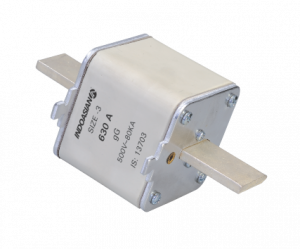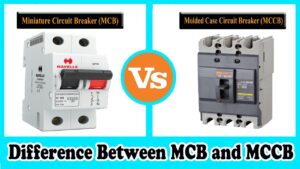
About HRC fuses
HRC fuse stands for high rupturing capacity fuse. They are the simplest form of fuses that are meant to limit an overflow of current through electrical circuits. HRC fuses are highly equipped to ensure safety by preventing short circuits in residential as well as commercial buildings. HRC fuses have wires that are designed to withstand short circuit currents for a short period. Beyond that, the fuse dissolves and protects the circuit from any mechanical damage.
Let’s learn more about HRC fuses.
Special characteristics of HRC fuses:
There are two special features of HRC fuses. They are:
- Braking ability:
The maximum limit of safe current should be much higher than the range of short-circuit current. The braking ability of HRC fuses enables them to disrupt the upper limit of safe current easily. HRC fuses used in residential buildings are connected to low voltages and have low interruption ratings. When it comes to commercial buildings, the interruption ratings of HRC fuses are much higher.
- I2t rating:
The expression of I2t depicts the amount of heat energy that is dissipated due to a current flow through circuits. In cases of fuses, it represents the melting point of the fuse. It is an expression of the amount of heat energy that is allowed to flow through the fuse without causing any electrical damage to the circuit. When the heat generated by the short-circuit current exceeds the I2t specification, the HRC fuse melts to prevent any fire hazard.
Advantages of HRC fuse:
There are several advantages of using HRC fuses. They are:
- HRC fuses are very cost-effective. They are cheaper than most fuses with the same rating.
- HRC fuses are powerful enough to offer high-speed operation.
- They are consistent in their performance.
- HRC fuses have a high breaking capacity.
- Their characteristic cut-off is very low.
- They have low power losses which save energy.
- HRC fuses are efficient enough to detect high as well as low fault currents.
- HRC fuse involves no gas emission after a short circuit occurs.
- HRC fuses are easy to install due to their compact dimensions.
- HRC fuses require less maintenance and replacements than most fuses and circuit breakers. Therefore, the maintenance cost is much lower for HRC fuses.
- The lifespan of the HRC fuse is very high.
- They are highly time-resistant.
- HRC fuses are sturdy. They are highly durable and can withstand extreme temperatures.
Disadvantages of HRC fuse:
Though they are very cost-effective, HRC fuses have a few disadvantages. The mechanism of HRC fuses is based on modern technology. HRC fuses need to be replaced after each use. The fuse also requires modification after every use. Once blown out, they cannot be reused. HRC fuses have arcs that emit heat and lead to the overheating of adjacent switches. HRC fuses do not have an outer covering. They are easily accessible which may be unsafe sometimes.
Visit IndoAsian to choose from an extensive collection of HRC fuses. Shop now!



